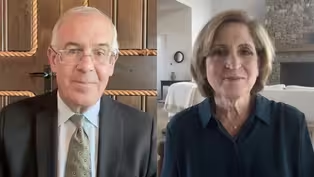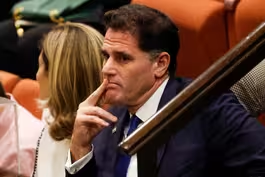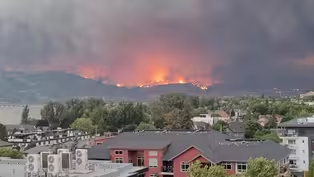
Japan, South Korea agree to strengthen military coordination
Clip: 8/18/2023 | 6m 59sVideo has Closed Captions
Biden reaches deal with Japan and South Korea to strengthen military coordination
President Biden met with the leaders of Japan and South Korea at Camp David on Friday. The two nations have long had antagonistic relations, but the meeting is a new starting point as they committed to improving military coordination. Geoff Bennett discussed the significance of the agreements with Mike Mochizuki of the Elliott School of International Affairs at The George Washington University.
Problems playing video? | Closed Captioning Feedback
Problems playing video? | Closed Captioning Feedback
Major corporate funding for the PBS News Hour is provided by BDO, BNSF, Consumer Cellular, American Cruise Lines, and Raymond James. Funding for the PBS NewsHour Weekend is provided by...

Japan, South Korea agree to strengthen military coordination
Clip: 8/18/2023 | 6m 59sVideo has Closed Captions
President Biden met with the leaders of Japan and South Korea at Camp David on Friday. The two nations have long had antagonistic relations, but the meeting is a new starting point as they committed to improving military coordination. Geoff Bennett discussed the significance of the agreements with Mike Mochizuki of the Elliott School of International Affairs at The George Washington University.
Problems playing video? | Closed Captioning Feedback
How to Watch PBS News Hour
PBS News Hour is available to stream on pbs.org and the free PBS App, available on iPhone, Apple TV, Android TV, Android smartphones, Amazon Fire TV, Amazon Fire Tablet, Roku, Samsung Smart TV, and Vizio.
Providing Support for PBS.org
Learn Moreabout PBS online sponsorshipGEOFF BENNETT: President Biden met today with the leaders of Japan and South Korea at Camp David, the presidential retreat.
Japan and South Korea have long had antagonistic relations but, today's meeting is a new starting point for the two countries.
They released the Camp David Principles, in which they promised to consult with one another if either felt their security was threatened.
They also committed to improving military coordination by sharing real-time information about North Korean ballistic missile launches.
Along with the U.S., they will expand trilateral military exercises and establish a three-way hot line for crisis communication.
President Biden said today's agreements would have long-lasting effects.
JOE BIDEN, President of the United States: This is a historic meeting.
But we're about to -- we have laid in place a long-term structure for a relationship that will last and have a phenomenal impact, not just in Asia, but around the world.
This is a big deal.
This is a big deal.
GEOFF BENNETT: A big deal, he says.
Well, just how significant are the new agreements?
Mike Mochizuki is a professor at the Elliott School of International Affairs at the George Washington University.
He focuses on Japan and security in Asia.
Welcome back to the "NewsHour."
It's good to have you here.
MIKE MOCHIZUKI, George Washington University: Thank you for having me on the program.
GEOFF BENNETT: So, these agreements on joint military and technology initiatives come against the backdrop of Beijing's growing power.
In your view, what impact will this have?
MIKE MOCHIZUKI: Well, first of all, I think what it does is, it enhances deterrence and coordination among the United States, Japan and South Korea to counter the aggressive behavior by China.
But there could also be a negative consequence of the Camp David summit, and that is that it could intensify the confrontation or divide between the United States, Japan and South Korea on the one hand and China, North Korea and Russia on the other hand.
And as a result of the Camp David meeting, the other trilateral could respond in ways that could actually undermine the security of Japan and South Korea.
GEOFF BENNETT: Well, one imagines that the annual joint military exercises between Japan and South Korea would most anger the Chinese government.
Of course, China just finished its own exercises with Russia.
How might China respond to that?
MIKE MOCHIZUKI: OK, well, what China will do is most likely engage in gray zone behavior, engage in more military exercises in Japan -- Japan's neighborhood with Russia, and will be less of a constraining force on North Korea in terms of the development of its nuclear weapons program.
And the real concern, I think, for Japan and South Korea is that this could lead to a real divide in Asia between those countries that seem to be much more dependent upon China and the countries in Asia that are aligned with the United States.
GEOFF BENNETT: What might this mean for Taiwan?
Because the three countries have an interest in the Taiwan Strait and the East China Sea.
MIKE MOCHIZUKI: Yes.
Well, certainly, the Camp David statement talked about the importance of peace and stability in the Taiwan Strait.
And this is something that the leaders of Japan and the United States and South Korea and the United States have already said in other joint statements.
But I think the real concern is that there might not be any kind of restraining factor in terms of the intensification of tensions across the Taiwan Strait.
And I sense that, in both Japan and South Korea, there's a feeling that the United States may be overreacting to some of the provocations by China, and, in so doing, might be exacerbating the tensions and ultimately increasing the danger of military conflict over the Taiwan Strait.
So, both Seoul and Tokyo would be very much interested in having the United States engage in a serious dialogue with China in order to stabilize relations with China and try to defuse tensions across the Taiwan Strait.
GEOFF BENNETT: This summit has been a real shot in the arm for American diplomacy in Asia, because the troubled relationship between South Korea and Japan has long been this sort of like weak link in Washington's efforts in the Indo-Pacific.
Why was the moment right now to bring this together?
And how was the Biden administration able to do it?
MIKE MOCHIZUKI: Well, I think, the major credit has to go to President Yoon.
Japan and South Korea had been locked in tensions regarding the wartime forced labor issue.
Japan insisted that the forced labor issue had been resolved in the 1965 normalization process.
In the end, President Yoon made the bold decision to basically make a dramatic concession to Japan, and have the South Koreans pay for the compensation for victims of forced labor.
Now, unfortunately, this has not been a popular decision in South Korea.
Sixty percent of the South Korean public oppose the decision by President Yoon.
So I think what President Yoon has been trying to do is to move very rapidly to improve security relations with Japan, as well as the United States, to lock in these gains, so that they will survive even after his presidential term ends in 2027.
And President Biden has seized this opportunity, this historic opportunity, to move the ball forward by inviting both Prime Minister Kishida and President Yoon to Camp David.
GEOFF BENNETT: Mike Mochizuki, thank you for your insights this evening.
We appreciate it.
MIKE MOCHIZUKI: Thank you.
Brooks and Marcus on Trump's Georgia indictment, GOP debate
Video has Closed Captions
Clip: 8/18/2023 | 8m 16s | Brooks and Marcus on Trump's Georgia indictment and upcoming GOP debate (8m 16s)
Comedian Atsuko Okatsuka on her journey to the stage
Video has Closed Captions
Clip: 8/18/2023 | 7m 33s | Comedian Atsuko Okatsuka on her journey to the stage and connecting with audiences (7m 33s)
Israeli minister on possible Saudi Arabia diplomatic deal
Video has Closed Captions
Clip: 8/18/2023 | 7m 35s | Israeli minister Ron Dermer discusses potential diplomatic deal with Saudi Arabia (7m 35s)
Residents flee Yellowknife as wildfire moves closer to city
Video has Closed Captions
Clip: 8/18/2023 | 2m 35s | Residents flee Yellowknife, Canada as wildfire moves closer to city (2m 35s)
Trump conspiracies inspire threats against civil servants
Video has Closed Captions
Clip: 8/18/2023 | 7m 19s | Trump conspiracies inspire threats against judges, jurors and election workers (7m 19s)
Providing Support for PBS.org
Learn Moreabout PBS online sponsorship
- News and Public Affairs

FRONTLINE is investigative journalism that questions, explains and changes our world.

- News and Public Affairs

Amanpour and Company features conversations with leaders and decision makers.












Support for PBS provided by:
Major corporate funding for the PBS News Hour is provided by BDO, BNSF, Consumer Cellular, American Cruise Lines, and Raymond James. Funding for the PBS NewsHour Weekend is provided by...




